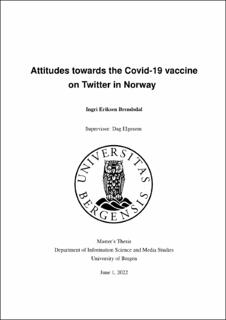| dc.description.abstract | The goal of this thesis is to characterize the distribution of attitudes present on Norwegian Twitter concerning the Covid-19 vaccine by implementing methods for text analysis and social media network analysis. The first analysis performed was manually classifying a sample of the dataset into four categories: irrelevant, neutral, vaccine hesitancy and anti-vaccine hesitancy. This sample dataset was used to train a supervised machine learning model, using BoW and SVM, in order to classify the total dataset. Furthermore, two methods for topic modeling were implemented: Latent Dirichlet Allocation and Biterm. Lastly, three main social networks were created: a mentioning-network containing users mention or mentioning in the dataset, a retweet-network containing users retweeted/quoted or retweeting/quoting and a sentiment network only including users classified as vaccine hesitancy and anti-vaccine hesitancy in the sample network. The ten users with highest scores for in-degree, out-degree and betweenness from the retweet network were analyzed to determine sentiment. The main findings are that the methods for topic modeling did not fit expectations and gave limited findings concerning topics in the theme, but topic modeling illustrated the amount of noise in the dataset. The manual classification resulted in approximately 30% vaccine hesitancy, while the trained supervised machine learning model resulted in only 10% vaccine hesitancy. The mentioning-network illustrated that the debate evolved and then stabilized through the autumn/winter of 2020. The most mentioned users were positive towards the vaccine. There was a separation regarding sentiment for the most retweeted and users retweeting most. Users displaying vaccine hesitancy sentiment tended to retweet slightly more than users displaying anti-vaccine hesitancy sentiment, and there were signs of echo chambers. | |
